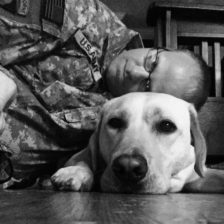Did you ever have a nickname growing up? I did. My grandpa Jack called me “monkeypoo.” Did you ever use a title before or after your name? Sometimes I go by “Mrs. Hoekstra” in the classroom. What about a name, title, or words/phrases used to describe you? Good or bad, we have probably all had a name, nickname, title, or phrase that we go by at some point in our lives.
One title that was very hard for me to accept was caregiver.
Caregiver, noun. A family member or paid helper who regularly looks after a child or a sick, elderly, or disabled person.
A military caregiver is a family member, friend, or acquaintance who provides care and assistance for, or who manages the care of, a current or former military service member. They help with a wide range of both physical and mental illnesses and injuries.
If you are a caregiver to someone, I see you. I really do.
If you make a list of “to-do” items for the person you care for, like a list of items they may forget to do, I see you.
If you have taken notes at a doctor’s office so you can remember a diagnosis, a treatment plan, or medication regimen, I see you.
If your child has secondary caregiver tendencies in that they remind their loved one to take medication, help soothe or comfort them when distressed, I see you.
According to a RAND study, there are 5.5 million military caregivers in the United States, 1.1 million of whom are caring for military veterans who served after the terrorist attacks of September 11, 2001. Post 9/11 caregivers differ from both civilian caregivers and earlier-era military caregivers.
So, how do you help? What can you do for a military caregiver or their family?
- Empower military caregivers: raise public awareness of the value of a caregiver.
- Create programs relevant to the mililtary caregiver’s needs: health care to caregivers, offset lost income, close gaps in needed programs.
- Ensure the long-term wellbeing of caregivers: help them plan for the future and allow for respite care.
- Call, text, or visit a caregiver that you may know. A little bit of kindness can go a long way.
- Seek out other caregivers or military spouses; let them know they are not alone.
My favorite TV coach, Ted Lasso, said it best.
“Please do me this favor, will you? Lift your heads up and look around this locker room. Look at everybody else in here. And I want you to be grateful you’re going through this sad mmoment with all these other folks because, I promise you, there is something worse out there than being sad. And that is being alone and being sad. Ain’t no one in this room alone.”
While a caregiver may not be in a locker room–the point is–caregivers are not alone.
Caregivers often fill from empty cups and are sometimes not so gentle with themselves. They may also feel isolated, alone, and as if they are carrying the weight of the world on their shoulders. Caregivers rise and take it all on at times. They may lose sleep, have bad days, hours, weeks, but they are fighters. Caregivers are strong, even when they feel weak.
I appreciate the title, I am proud to be a military caregiver. I am honored to walk alongside so many who provide care to their spouse, loved one, or family member.

